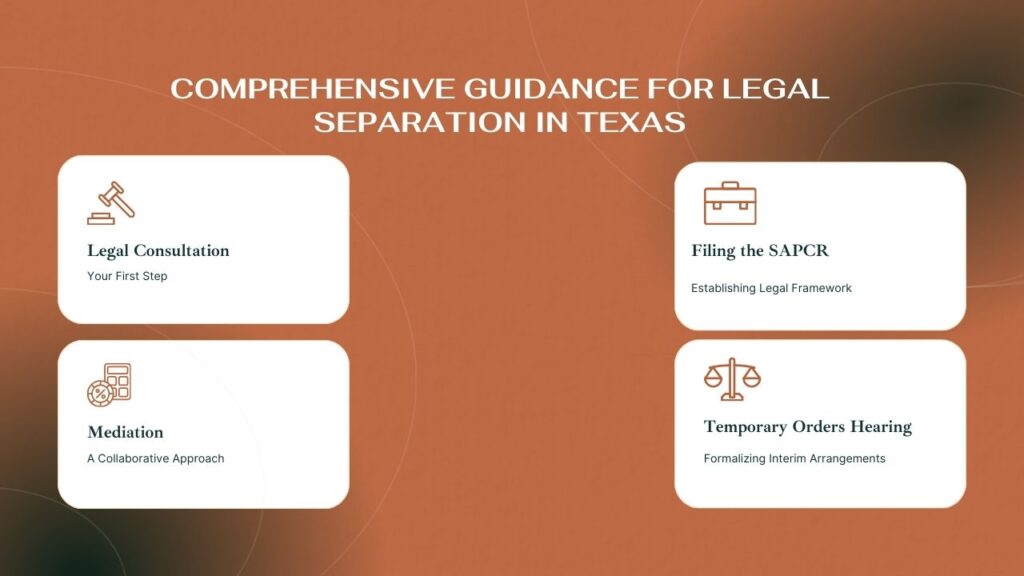Charting Your Path: Legal Separation in Texas – Insights, Steps, and Support
Navigating the complex panorama of felony separation in Texas calls for comprehensive information on the country’s legal guidelines and policies. In this guide, we’re going to delve into the intricacies of legal separation, imparting treasured insights, step-by-step steering, and assistance for individuals taking into account this significant decision. Whether you are exploring the concept of legal separation for the first time or searching for readability on the method within the country of Texas, this blog intends to be your complete aid.
Understanding Legal Separation in Texas
Legal separation in Texas is a proper manner that permits couples to stay one by one, even addressing important criminal matters along with infant custody, guidance, and department of belongings. Unlike some different states, Texas does not formally recognize prison separation. However, couples in Texas can achieve similar outcomes through a Suit Affecting the Parent-Child Relationship (SAPCR) or a Temporary Orders hearing.
Insights into the Process
- Initiating the Process: The first step in legal separation in Texas involves filing a SAPCR. This felony record outlines the phrases for baby custody, visitation rights, and toddler aid. Additionally, it addresses troubles which include spousal support and using network belongings during the separation.
- Temporary Orders Hearing: Couples may additionally choose to wait for a Temporary Orders listening to formalize the phrases of separation. This listening permits the courtroom to trouble brief orders on toddler custody, economic aid, and different pertinent matters while the divorce lawsuits are pending.
- Mediation and Negotiation: Texas encourages couples to resolve disputes through mediation. This alternative dispute resolution process enables parties to negotiate terms with the assistance of a neutral mediator, fostering a collaborative and less adversarial environment.
Comprehensive Guidance for Legal Separation in Texas

Legal Consultation: Your First Step
Embarking on the journey of legal separation in Texas necessitates a radical expertise of your rights and obligations. Consulting with an informed family regulation lawyer is the vital first step. A seasoned lawyer can provide customized steerage primarily based on the precise instances of your case, supporting you’re making knowledgeable choices all through the separation system.
Filing the SAPCR: Establishing Legal Framework
The SAPCR serves as the cornerstone of legal separation in Texas. Filing this document formally establishes the terms of child custody, visitation, and support. It also addresses spousal support and the use of community property during the separation period. Ensuring the accuracy and completeness of the SAPCR is essential to avoid complications during the divorce proceedings.
Temporary Orders Hearing: Formalizing Interim Arrangements
Attending a Temporary Orders hearing is an option for couples seeking to formalize interim arrangements during a legal separation. This hearing allows the court to issue temporary orders on various matters, providing clarity and structure while awaiting the finalization of the divorce. It is a critical step in ensuring the well-being of both parties and any children involved.
Mediation: A Collaborative Approach
Mediation can be a transformative element in the legal separation process. By engaging in open communication and negotiation facilitated by a neutral mediator, couples have the opportunity to find mutually agreeable solutions. Mediation fosters collaboration and understanding, potentially reducing traditional litigation’s emotional and financial strain.
Navigating Emotional and Financial Challenges During Legal Separation
The Emotional Aspect: Seeking Therapeutic Support
Legal separation is not only a legal process but also an emotional journey. Seeking therapeutic support is a proactive step toward managing the emotional challenges that often accompany the dissolution of a marriage. Professional counselors or therapists can provide coping mechanisms and strategies to navigate this difficult period.
Financial Strain: The Importance of Financial Guidance
Financial strain is a common concern during legal separation. Consulting with a financial advisor is invaluable in navigating the economic aspects of separation. A financial professional can guide budgeting, asset division, and long-term financial planning, helping individuals achieve a fair and sustainable financial future post-separation.
Community Support: Connecting with Resources
Local help organizations and network resources play a critical role in providing a feel of community and know-how in the course of criminal separation. Connecting with others who are skilled or are going through comparable challenges can provide emotional support, realistic recommendations, and a feeling of camaraderie.
Conclusion: Empowering Your Journey
In conclusion, legal separation in Texas is a multifaceted process that demands careful consideration of legal, emotional, and financial aspects. By following the insights and steps mentioned in this manual, people can empower themselves to navigate the complexities of criminal separation with confidence and resilience.
Embarking on the journey of prison separation in Texas can be difficult, but with the proper knowledge, assistance, and a proactive approach, people can transition to a brand new bankruptcy in their lives with extra clarity and self-assurance. Remember, every case is particular, and looking for expert prison recommendations is critical to ensuring your rights and interests are protected in the course of the system.






